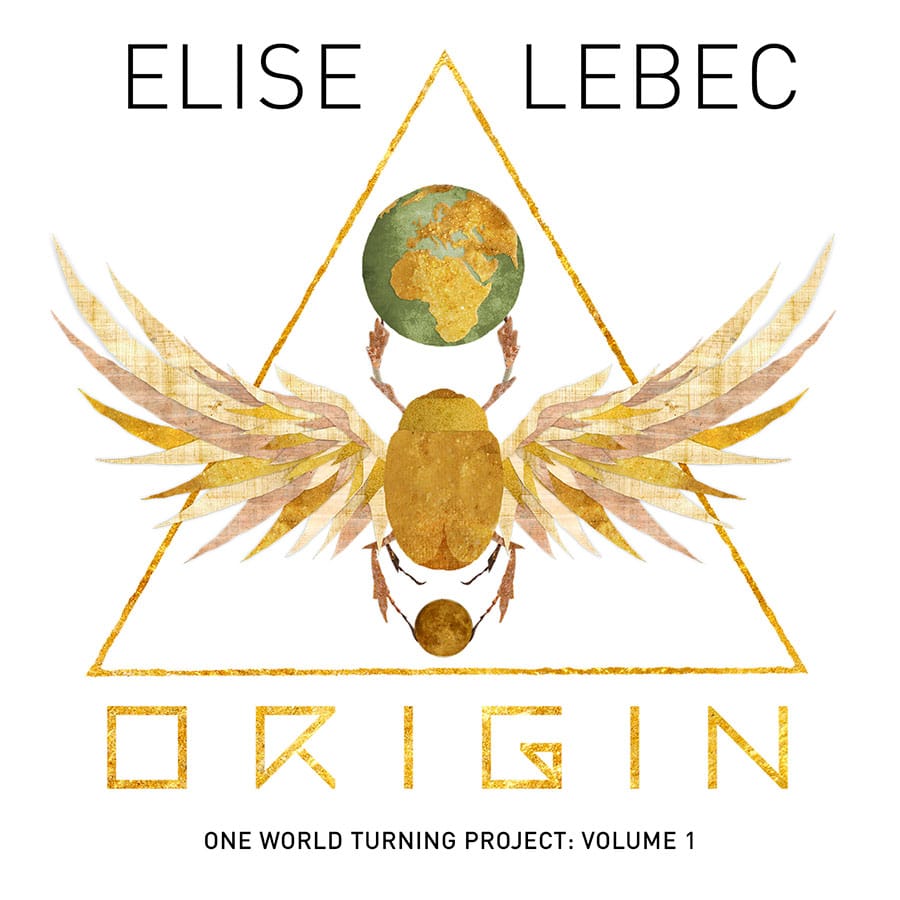
Within the walls of Luxor in Egypt is found this proverb “Know the world in yourself. Never look for yourself in the world, for this would be to project your illusion. To teach one must know the nature of those whom one is teaching.”
With this said, one discovers another wonder in the Valley of Kings…Composer Elise Lebec.
In the many years of reviewing and interviewing gifted talent and their work this is my first exposure to eminence of energy morphed with prominence in performance. In this two-part interview I will examine the full dimension of one of the music industries most intriguing and multi-talented performance to date as World Music takes a major jump into a civilization that seldom does get unmasked and exhibited with a massive dose truth, effort and education. Composer Elise Lebec, coming of her 2014 success “Heart Song”, brings another triumph in composition and approach. Origin – One World Turning Project Volume 1 is an effort erected for humanity about humanity with a deep and passionate voice attached.
Ms. Lebec on a last minute whim voyaged to Egypt as a tourist but returned as a musical “Orator for an Oasis” for a culture deep in history, mystery and legendary speculation. Her arrangement’s are crisp and flow like the currents of the Nile. Her words are equal to those on the walls of any catacomb. Her voice calls to the ghosts of the desert winds and exhumes the emotions of a culture past and present. With Origin – One World Turning Project’s birth, Egypt is not only rich in history but also, richer in music thanks to Ms. Lebec.
In part one of this two-part interview we will explore the reasons for Ms. Lebec’s quest and how a simple last minute whim morphed into what could very well be a Grammy Award winning execution of excellence. I will explore some of her cuts including how “Bolero” became her problem child yet chiseled itself into the walls of the Egyptian culture. Ms. Lebec also explains how a cultures past spoke to her as if she was reading the “Ancient Egyptian Book of the Dead” exhuming back to life the tears and joys of spiritual civilization which today we can only speculate about. An amazing story and amazing effort from an amazing woman who brings a mystical culture back to life through music and voice. Unlike many efforts of this season Origin – One World Turning Project unlocks the tombs of the mediocre montage of music to unearth that rare antiquity known as the White Crown of World Music!
Now its time to start your expedition into the tombs and sarcophagus’s of Elise Lebec extraordinary journey. Origin – The World Turning Project is sure to bring out the hidden adventures in all our musical existences.

Karl Stober: Elise, explain to our readers how it came to be that Egypt was the origin of your new release?
Elise Lebec: I happened to take a tour to Egypt run by an employee of mine back in 2016. She was organizing a tour for five people and said there was room for me to join. I hesitated until the very last second and then suddenly found myself buying a ticket to Cairo, Egypt and saying goodbye to my family for two weeks. When I got there it was hot and dry and exotic, like nothing I had in mind. It was like going back in time 200 years. It wasn’t until spending five days onboard a beautiful Nile boat with a wonderful staff of Egyptians and visiting a few very special temples that I knew I would be back again. It was actually their love of music and their pride of being upper Egyptians that made me fall in love with it too. Kawood, the Upper Egyptian tour manager turned me on to some very cool music and instead of being afraid of it I dove in and wanted more. The music was so different from anything I had ever heard before that it had to be the challenge I craved as an artist. It wasn’t just the music though, it was the energy and ‘air’ of the performances who were such old souls calling out to me. I had to listen! I heard a yearning in the music that I missed hearing in western music. The pure request for love and connection is in the older Arabian music. In the voices of the performers!
Karl Stober: What era of the Egyptian culture and history excited your creative juices enough to go forth and pull this album from the tombs of your heart?
Elise Lebec: When I went to the temple of Edfu I certainly felt energy there from another world. There was no doubt a force existing within the temple walls. I had a deep meditation there but I took no solid answers with me. It wasn’t until the temple of Saqqara that I truly had a breakthrough within myself because I had to let go of something very dear to me in order to truly allow my heart to open again. According to Wikipedia, Saqqara is “The earliest burials of nobles can be traced back to the First Dynasty, at the north side of the Saqqara plateau.” I had a bag of runes that my first husband gave to me when we first met. I had carried it around with me for 16 years after he died and I hadn’t really had the chance to say goodbye to him or give him the burial that I thought he deserved. So when I heard we were going to this royal burial site called Saqqara I knew that it would be time to say goodbye to him there and to let him go. I did a deep meditation just outside the temple and buried a crystal in the ground of the temple and then as I was walking to get back in the van to drive away I walked past an excavated burial site, a deep hole that went on forever into the underworld and there I dropped the runes and said goodbye. I really believe that this was the turning part in my spiritual awakening. The next chapter of my life had begun…
Karl Stober: Amunet was one of the goddesses of creation, as was Ptah the God of Creation. Is there any God that you feel, if any, influenced your trip and the music in Origin – One World Turning Project Volume 1? Expand!
Elise Lebec: Well I’m not really supposed to talk about this. It is upsetting to Egyptians, as they don’t like to talk about Sekhmet, as she is still a feared Goddess I believe. The Egyptian mysticism and magical history is deep within our ancestry as humans. According to Wikipedia “ Temples and cults in Egypt itself declined as the Roman economy deteriorated in the third century AD, and beginning in the fourth century, Christians suppressed the veneration of Egyptian deities.[208] The last formal cults, at Philae, died out in the fifth or sixth century.[216][Note 6]Most beliefs surrounding the gods themselves disappeared within a few hundred years, remaining in magical texts into the seventh and eighth centuries. But many of the practices involved in their worship, such as processions and oracles, were adapted to fit Christian ideology and persisted as part of the Coptic Church”[ Frankfurter, David, “Histories: Egypt, Later period”, in Johnston 2004, pp. 161–163
Now, we know that most of Egypt is with the Islamic faith which also has its own mystical practices under the Sufi way of life. However, I was most intrigued by the ancient warrior goddess, Sekhmet. I was quite astounded to look up into this statue that stands 7 feet tall and is made of the blackest stone you’ve ever seen and look into the face of a loving strong grandmother-like figure whose eyes could pierce through fire. I didn’t believe she was real until I stood before her that one hot day in March 2016. After that I can’t say I don’t believe in her. Her eyes are life like and her spirit is one of a spiritual elder. She was and is the directing force in the making of this album. Many blessings to Sekhmet!!
Karl Stober: How did you come up with the title Origin?
Elise Lebec: The name came to me right away as I dove into the history of Egypt and many of the things that I grew up with and the symbols of our current civilization all originated in Egypt. Everything we know started in Egypt and then grew from there. It seemed that in order to evolve we might want to consider our origin in order to truly understand how we came to be with this way. The music that I recorded in Egypt was as traditional and original as I could get. I used only Upper Egyptian instruments and musicians in order to capture the music at its origin.
Karl Stober: To be honest your song selections act as a guide through what is without question a mysterious and wondrous culture. One gets the feel the Nile is in your sites and you at times are walking through the tombs of the great pyramids. Explain whether that was your goal or if not why do you think they have that effect.
Elise Lebec: I didn’t really have a goal in mind but the spirits that led me did! It really shows in the music. I had let the music carry me so-to-speak because I didn’t know anything about Arabic music! I had to learn quickly this new harmonic scale. As a singer I found it extremely difficult to adjust my throat in order to accommodate the new sound. I spent most of the time just listening to as much traditional Egyptian music as I could. The first five days were spent sailing down the Nile River on my first visit to Egypt. I think this allowed my soul to really feel the energy of the water and the scenery changing everyday exposing the ancient culture on the sides of the Nile. Every time I went to Egypt I went on a completely different journey through sound, music and prayers. My own personal tunnels of spiritual awakening! I asked the Goddesses and Gods to direct me and to keep me open so I could hear the melodies. I know it might sound arrogant but I really did feel that the spirits were directing me and exposing me to their mysteries and sacred secrets. The melodies are part of these secrets and meditations. The melodies came to while visiting these scared places.
Karl Stober: You are quoted as saying “ Unlike other albums, you let the music tell you how to orchestrate it.” On this album… Please explain that process and how you felt during a completely different mindset then what you are used too.
Elise Lebec: So there was a few things going on in this album that really made me change the way I compose and create. For one thing I was working with some of the very best musicians and producers in both USA and Egypt so even as much as I tried to control my project I had to let go much of the time and just let the process take the album where it was meant to go. It was hard for me to let go because I’m normally a solo artist and what I decide is how it goes, end of story. At the same time though in letting the process go in its own direction, I had to be true to the spirits who were governing it. It was a very hard album to make to say the least!!!
Karl Stober: What was your psyche like exploring Egypt and then bringing back your thoughts to finish Origin – One World Turning Project Volume 1, away from the wonders that affected you.
Elise Lebec: My psyche felt like it was possessed almost. There I was flying back and forth to Egypt in the middle of all these terrorists’ attacks, the Muslim ban, and protests at airports. It was as if I was walking through fire without getting singed. I was on a mission. I knew deep in my heart that I had to do this to prove that we could make peace even when it seemed unlikely. I wasn’t trying to prove it to society; it was as if I was proving it to my higher power. I was the high Priestess making an offering on behalf of those who couldn’t see it but needed it. My psyche was alive and determined and focused and strong like it has never been before. The result was much more than an album. Many beings came to help with this project including a very well known Sheikh whose entire life is to create peace for his community and spiritual awareness. These people sacrifice so much to be in that position and he was drawn to perform on the ORIGIN album because of the cause behind it.
Karl Stober: Do you remember the exact moment you knew Egypt was where you had to create your next spin? Describe that moment.
Elise Lebec: I don’t remember exactly when I decided that! It was more like a dream. I woke up and found myself on a plane to Cairo singing melodies into my phone to hopefully capture enough ideas to get started when I landed. The ideas only came once I landed. Some of the melodies felt like they had been with me my whole life whereas other ones lived in the air in Egypt. Or perhaps in the long forgotten silence.
Karl Stober: Lets get into the Origin – One World Turning Project Volume 1 of some of the cuts on the album. Which cut was most emotional for you? Explain why.
Elise Lebec: Bolero was the most emotional song to create. At first it was just an instrumental and to be honest I still feel that the words are redundant because the melody so convincingly tells you what the song is about. But for some reason this song haunted me. It makes me cry every time I hear it. Like it is a long lost time or lover. An era forgotten in the rubble of history… Somewhere way back in my life chain there was the most profound love and the tune that of that love is Bolero!
Karl Stober: In any album there is a nasty spin that gives one the most problems either creatively or emotionally. Which one is that child and explains why even though it was a chore to get done it still had to be finished and included?
Elise Lebec: I feel that Bolero was the most difficult. It was such a way in my head that every time I tried to sing it, it just didn’t sound the way I heard it in my head. I would love Blonde to sing it! The piece of music is so dear to me that nothing really came close to how I heard it in my head. Was quite frustrating. I think the melody might be from another world transported here through the great Pyramid of Gizah.
Karl Stober: On many of the cuts, vocals are placed with ever so much care and sparingly. What was the process deciding where the vocals were injected? Did the music also dictate that placement as well or instinct?
Elise Lebec: Yes the music dictated everything from the start to finish. I was ever so careful to stay true to the musicianship of the Arabic side and then the melodies that came to me from the spirits in Egypt and then the beautiful western instruments as well that came together! The vocals had to be strong female essence but not over power the music. I wanted to create a balance of male and female energy not just in the music but also in the way the music was presented. The vocals needed to sit in the music but not take the listener away from their own projections and interpretations of the music. This is the New Age part of the album. New age music has always transported the listeners to their own world. Good music does that. I love that we all have our own imaginations and fantasies and in this world of technology we often don’t get the chance to use our own creativity in conjunction with another person’s creation. I wanted to make sure that the journey of this album was individual and special for each listener’s mind.
In part two of this interview I will explore Elise Lebec’s inner psyche along with dissecting each cut and they’re inner meaning and the process of developing them. Like any expedition there will be surprises as well. Till next month keep the Rising Sun shining in all our hearts and musical desires.






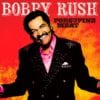

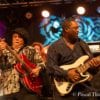
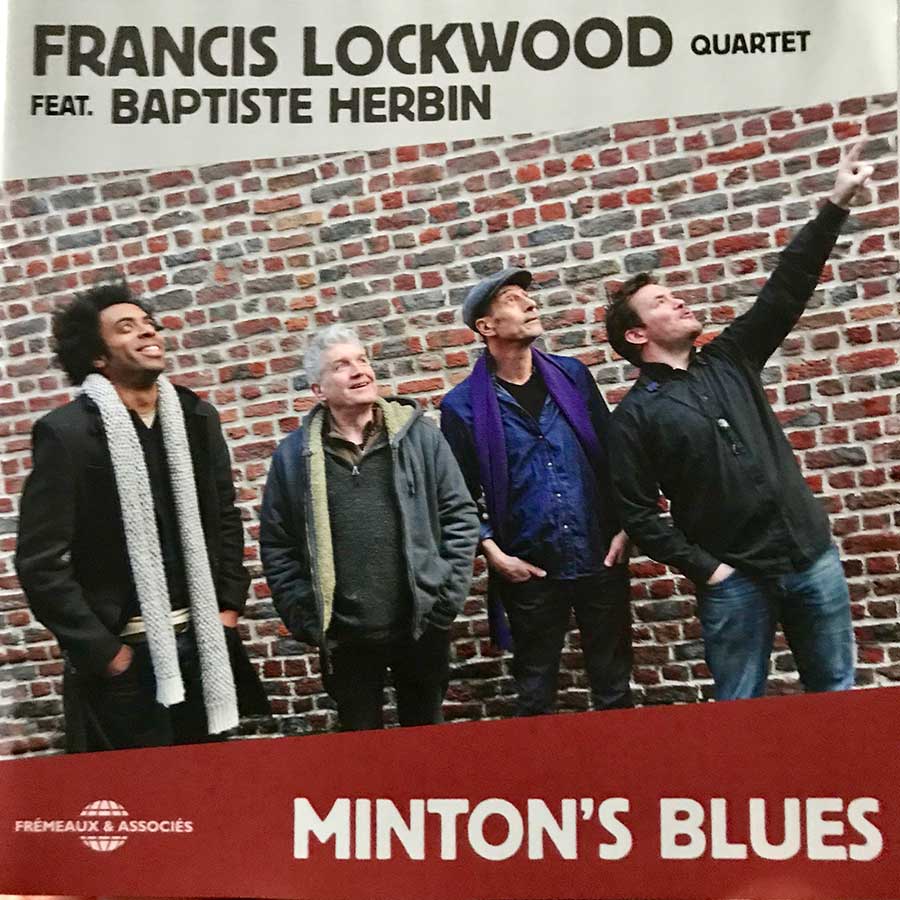


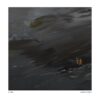
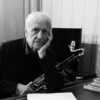
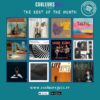


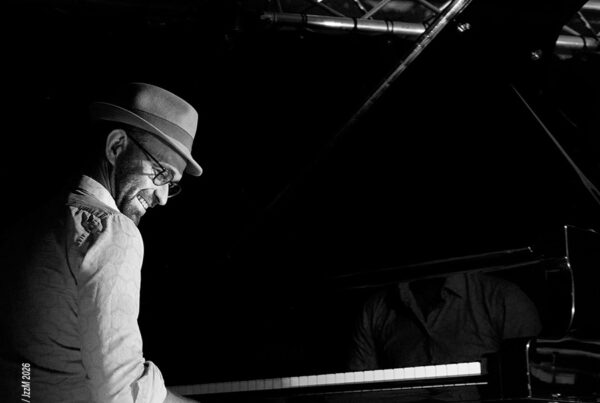
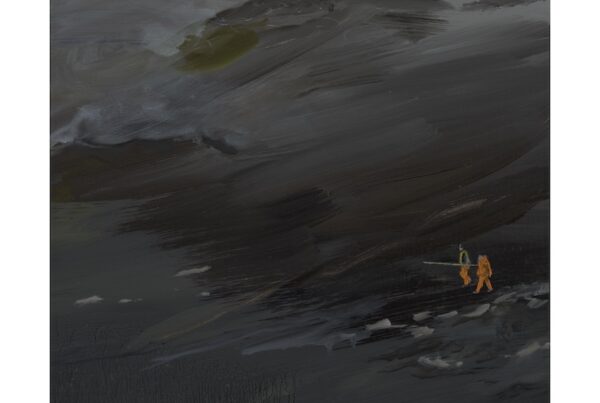
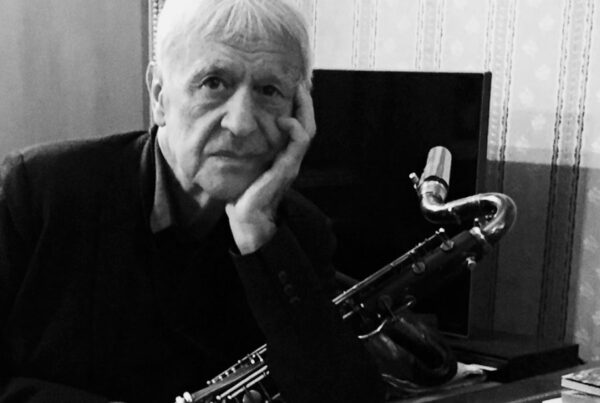


RECENT COMMENTS